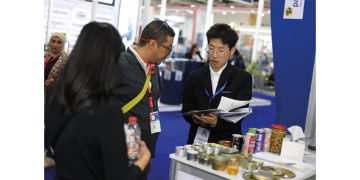The halal food market has grown quickly over the past decade, and is now worth an estimated $632 billion annually on a global scale
According to a recent global market research, Muslims represent an estimated 25% of the world’s population, with around 1.6 billion consumers. This large consumer market presents several opportunities for halal food products. Not only is the Muslim population growing, but also Muslim consumers are increasingly better educated, with higher household incomes, paving the way for a worldwide demand for mainstream products and services that conform to Islamic values. Halal food is prepared following a set of Islamic dietary laws and regulations that determine what is permissible, lawful and clean. The halal food market has grown quickly over the past decade, and is now worth an estimated $632 billion annually. As such, it represents close to 17% of the entire global food industry. In order to conform to Islamic standards; all Muslims must ensure that they are only consuming halal approved food, drink and medicine. The large population of Muslims adhering to halal requirements has fuelled increased global demand for halal products. Several multinationals, such as Tesco, McDonalds and Nestlé, have recognized this, and have expanded their halal approved product lines. Because of the traditional nature of the marker, it is estimated that these multinationals control 90% of the global halal market. The global halal food market was not significantly affected by the global financial recession. Major growth in Asia has been driven by changing lifestyles that allow for higher incomes. The largest contributors to the halal market in Asia are Indonesia, China, India, Malaysia and the Gulf Cooperation Council (GCC) members, including the United Arab Emirates, Bahrain, Saudi Arabia, Oman, Qatar and Kuwait. These countries have all seen substantial growth in the halal food industry that is unlikely to be curbed in the near future. There is also strong potential for halal certified products in non-majority Muslim markets, where consumers are looking for safe and ethical products. The increasing popularity of the halal market in Europe is driven by Russia, France and the United Kingdom. The halal market in these countries has continued growing since 2004, albeit at a slower pace than Asian markets. A major opportunity can be found in the Australia/Oceania region, where the halal food market saw growth of 33.3% in recent years. A key area for development is in the supply of halal certified products to more affluent Muslim and non-Muslim consumers looking for a more diverse range of halal products. Canada’s reputation for high-quality, well regulated and safe agro-food products make it well positioned to enter the global halal market. The most promising halal markets span over a range of different countries. As the largest populations of Muslim’s are located in the Asia-Pacific region, both majority and non-majority Muslim countries in this region would have high demand for halal products. However, markets in North Africa and the Middle East are particularly lucrative markets, as several countries have majority-Muslim populations. The halal food industry is also growing in countries that have smaller populations of Muslims, but that have food quality and safety concerns, such as Australia, the United States and European countries. Key halal markets include Algeria, Egypt, Indonesia, Iraq, Morocco, Iran, Malaysia, Turkey, Tunisia, Kuwait, Jordan, Lebanon, Yemen, Qatar, Bahrain, Syria, Oman, Pakistan, Saudi Arabia, and United Arab Emirates,. Emerging halal markets with relatively large Muslim populations include India (177 million Muslims), China (23 million), Russia (16 million), the Philippines (5 million), France (5 million), Germany (4 million) and the United Kingdom (3 million). To sum up: 25% of the world’s population is Muslim accounting nearly 1.6 billion people. Food products are prepared following a set of Islamic dietary laws and regulations, which determine what is permissible, lawful and clean, are classified as halal. The halal food market has grown quickly over the past decade, and is now worth an estimated $632 billion annually on a global scale. Strong economic growth and rising per capita incomes have fuelled demand for diversified halal products, enabling higher consumption levels and more opportunities for halal food producers. Halal consumption is not limited only to the Muslim population; other consumer goods are seeking halal food due to halal food’s excellent reputation for healthy and safe food products, and the humane treatment of animals.












